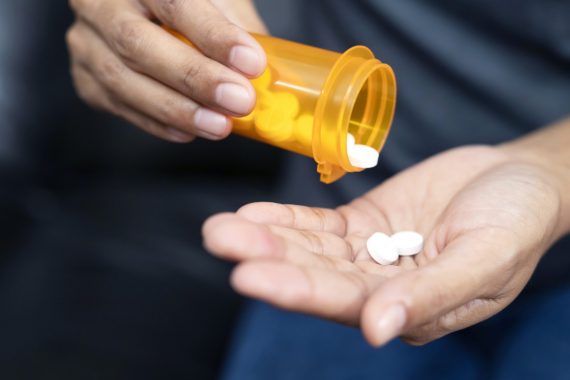A campaign encouraging GPs to ‘think twice’ before putting patients on opioids for non-cancer pain has been effective in reducing prescriptions, a pilot study has shown.
As a result of the campaign, roughly 15,000 fewer people were given opioid prescriptions over the year-long trial.
This is equal to a net saving of more than £700,000 to the NHS once all other costs have been included.
The campaign to reduce opioid prescribing (CROP) was trialled in 316 GP practices in Yorkshire between 2017 and 2018, and caused a small decrease in prescription rates during the intervention.
The CROP gave practice-specific, evidence-based and theory-informed feedback with ‘persuasive messaging’ and ‘suggested actions’ to GP practices twice a month over one year.
GPs were advised to prescribe opioids ‘with caution’ and review patients currently on opioids with ‘no clear individual benefit’.
Some 130 practices were included in the study as a control group who did not receive any feedback.
Before the CROP, the rate of opioid prescribing was growing in the intervention group by 0.18 per 1000 patients/month, compared to the control group, in which it was 0.36 per 1000 patients/month.
During the CROP, the rate of prescribing in the intervention group fell by 0.11 per 1000 patients/month, while it increased in the control group to 0.54 per 1000 patients/month.
The research paper concluded: ‘Repeated comparative feedback offers a promising and relatively efficient population-level approach to reduce opioid prescribing in primary care, including prescribing of strong opioids and prescribing in high-risk patient groups.
‘Such feedback may also prompt clinicians to reconsider prescribing other medicines associated with chronic pain, without causing a rise in referrals to musculoskeletal clinics. Feedback may need to be sustained for maximum effect.’
Previous research had shown a rise in opioid prescribing for non-cancer pain in Leeds and Bradford, despite ‘limited knowledge on effectiveness and increasing evidence of harms, such as falls, fractures, overdose, and addiction’.
A general increase in the number of opiates being prescribed by doctors has been linked to ‘increased psychosocial problems, hospitalisations, and mortality’.
The Yorkshire pilot study came about because another study suggested that GP prescribing ‘habits and norms’ are a key factor in the increase, rather than ‘patient need and evidence of benefit’.
Public Health England’s landmark 2019 review into prescription drug addiction concluded that one in four adults – over 11m adults in England – received a prescription for antidepressants, opioids, gabapentinoids, benzodiazepines or z-drugs in the previous year.
NICE final guidance on chronic pain, published in April, recommended that GPs should ‘encourage and support’ patients to stop taking opioids in certain cases.
It said GPs should consider alternatives such as certain antidepressants, an exercise programme, CBT or acupuncture.
It reiterated that NICE is developing a guideline on medicines associated with dependence or withdrawal symptoms, due to be published next month.
Last month, the Government pledged to ‘take action’ on overprescribing after an official review concluded that 10% of medicines dispensed in primary care in England were not needed.
Click to complete relevant pain relief CPD modules on Pulse learning.


















READERS' COMMENTS [1]
Please note, only GPs are permitted to add comments to articles
The Americans like GM-CROPs so you’ll have to advance your techniques. Merely the CD and red colour on Emis is enough for us to shudder. Nevertheless, the rest of the middle and upper class’ kids in particular are on prosecco cocaine cocktails and heroin, so cheers to that GovUk.